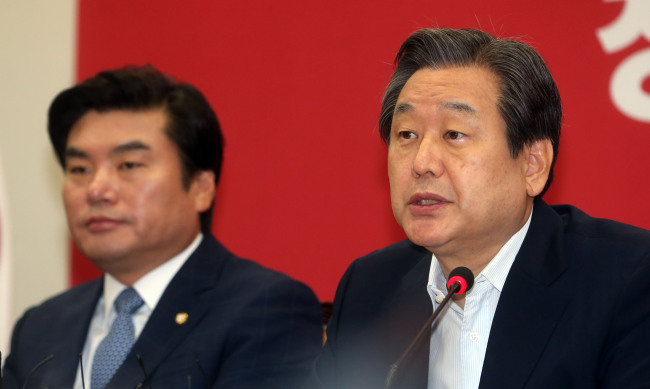Rival parties lock horns over Internet portal news
By Yeo Jun-sukPublished : Sept. 10, 2015 - 18:14
Mudslinging between the rival parties is in full swing over the ruling Saenuri Party’s public accusation that the country’s two major Internet portals are politically biased.
The main opposition New Politics Alliance for Democracy has slammed the ruling party attack as an attempt at censorship ahead of the parliamentary elections next year.
At the center of the dispute is Saenuri Party chairman Rep. Kim Moo-sung, who has been unleashing remarks daily targeting Naver and Daum Kakao.
The Saenuri Party has been asserting that the Internet portals, which it describes as “de facto mainstream media outlets,” have intentionally painted a negative picture of the ruling party and violated the principle of media neutrality in political affairs.
“We need to discuss ways to ensure the fairness and objectivity of portal news,” Kim said. “I believe the portals are virtually news media as they are able to change headlines.”

He also took issue with the portals’ “lenient” regulations by acknowledging one-man news groups as media, which he said enabled them to use their news reports as bait to pull in visitors and attract advertisements from businesses.
The party has demanded the chiefs of the two companies face questioning during the parliamentary audit session that opened Thursday.
The Saenuri Party’s think tank, the Youido Institute, backed the party’s argument, with its big data analysis of the news reports carried by the two portals. The findings suggested that the reports highlighted by the portals are more hostile toward the ruling party and the government.
The NPAD, has rebuked the Saenuri Party, accusing it of putting pressure on the major portals in the run-up to next year’s general elections.
The NPAD dismissed the Youido Institute study as biased and manipulated, and denounced the party for seeking to strongarm the portals to create favorable public opinion toward the government and the ruling party.
“The people are aware that (Kim’s) intimidation against the portals stems from his personal and political greed ahead of the general and presidential elections,” said NPAD lawmaker Choi Min-hee during a party meeting Thursday.
“I would like to ask him whether he is aware of the RUBICS system (Real-time User Behavior-based Interactive Content recommender System) and the technology used by the portals to operate? Rep. Kim is basically fighting with the IT system.”
The NPAD spokesman Kim Yung-rok said that the Saenuri Party had constantly raised the issue before the elections because the portals had significant influence over the voters, particularly those in their 20s and 30s.
The portals have become Korea’s most influential news providers, especially for young voters, as they use the Internet as the most frequent medium to access the news produced by traditional news outlets such as newspapers, radio and television, as well as Internet news groups.
Rather than clicking on individual media websites, the users often click onto the portals, which aggregate the headlines of registered media groups on their main or news page. They also provide rankings of most searched words and news reports.
According to a survey by the Korea Press Foundation, the Internet was the most frequent access point for news. In a one-week analysis over the method respondents used to keep up with the news, nearly all, or 99.6 percent of those in their 20s and 98 percent of those in their 30s said they used the Internet. The number was bigger than that of newspapers (17.6 percent of 20-somethings and 22 percent of 30-somethings) and television (86 and 92.8 percent).
The portals, for their part, rushed to respond to the escalating debate. Naver said it would hold an editorial advisory board meeting to review the institute’s findings and discuss measures to address the issue.
Daum denied the accusation that they univocally changed headlines. The Internal giant said in a statement that they did not change the headlines arbitrarily unless they needed to quickly adjust the number of characters to fit the site’s layout.
Experts were also split on the issue, with some stressing the freedom of the press and others highlighting neutrality.
“Under a democracy, a media outlet’s major role is its criticism of the government and the ruling party,” said Kang Sang-Hyun, a journalism professor at Yonsei University. “Media outlets can criticize the policies they oppose and praise the policies they approve of,” Kang.
“If the users find reports interesting, they will top the most-favored list. If not, people wouldn’t read them. This is how the current media landscape works. Bringing in the portals’ CEOs and yelling at them is absurd and wrong. I am afraid the move is similar to what dictatorships would do,” Kang said.
Shin Sung-ho, journalism professor at Sungkyunkwan University, gave a different point of view.
“Most people access news through portals, which are basically operating as media. It is only right that (the portals) therefore take due responsibility and face regulations as a media,” he said.
“While news is also cultural content, (the portals) are making it appear like it is free … this is a unique phenomenon only seen in Korea. There is a need to fix this,” Shin added.
(jaonsyeo@heraldcorp.com)




![[Herald Interview] 'Amid aging population, Korea to invite more young professionals from overseas'](http://res.heraldm.com/phpwas/restmb_idxmake.php?idx=644&simg=/content/image/2024/04/24/20240424050844_0.jpg&u=20240424200058)











![[KH Explains] Korean shipbuilding stocks rally: Real growth or bubble?](http://res.heraldm.com/phpwas/restmb_idxmake.php?idx=652&simg=/content/image/2024/04/25/20240425050656_0.jpg&u=)

